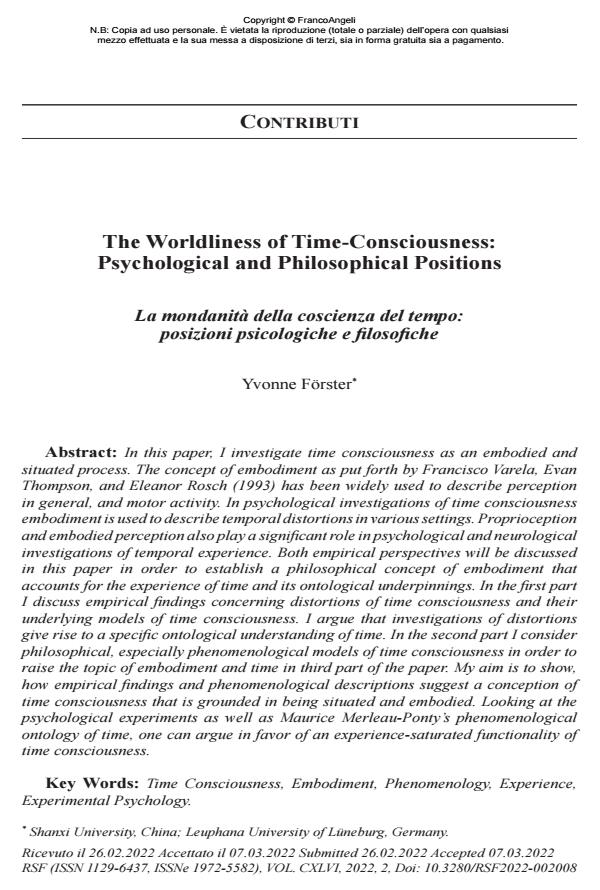The Worldliness of Time-Consciousness: Psychological and Philosophical Positions
Titolo Rivista RIVISTA SPERIMENTALE DI FRENIATRIA
Autori/Curatori Yvonne Förster
Anno di pubblicazione 2022 Fascicolo 2022/2
Lingua Inglese Numero pagine 15 P. 109-123 Dimensione file 166 KB
DOI
Il DOI è il codice a barre della proprietà intellettuale: per saperne di più
clicca qui
Qui sotto puoi vedere in anteprima la prima pagina di questo articolo.
Se questo articolo ti interessa, lo puoi acquistare (e scaricare in formato pdf) seguendo le facili indicazioni per acquistare il download credit. Acquista Download Credits per scaricare questo Articolo in formato PDF

FrancoAngeli è membro della Publishers International Linking Association, Inc (PILA), associazione indipendente e non profit per facilitare (attraverso i servizi tecnologici implementati da CrossRef.org) l’accesso degli studiosi ai contenuti digitali nelle pubblicazioni professionali e scientifiche.
In this paper, I investigate time consciousness as an embodied and situated process. The concept of embodiment as put forth by Francisco Varela, Evan Thompson, and Eleanor Rosch (1993) has been widely used to describe perception in general, and motor activity. In psychological investigations of time consciousness embodiment is used to describe temporal distortions in various settings. Proprioception and embodied perception also play a significant role in psychological and neurological investigations of temporal experience. Both empirical perspectives will be discussed in this paper in order to establish a philosophical concept of embodiment that accounts for the experience of time and its ontological underpinnings. In the first part I discuss empirical findings concerning distortions of time consciousness and their underlying models of time consciousness. I argue that investigations of distortions give rise to a specific ontological understanding of time. In the second part I consider philosophical, especially phenomenological models of time consciousness in order to raise the topic of embodiment and time in third part of the paper. My aim is to show, how empirical findings and phenomenological descriptions suggest a conception of time consciousness that is grounded in being situated and embodied. Looking at the psychological experiments as well as Maurice Merleau-Ponty’s phenomenological ontology of time, one can argue in favor of an experience-saturated functionality of time consciousness.
In questo articolo, indago la coscienza del tempo come processo incarnato (embodied) e situato. Il concetto di embodiment proposto da Francisco Varela, Evan Thompson ed Eleanor Rosch (1993) è stato ampiamente utilizzato per descrivere la percezione in generale e l’attività motoria. Nelle indagini psicologiche sulla coscienza del tempo l’embodiment è usato per descrivere distorsioni temporali in vari contesti. Anche la propriocezione e la percezione incarnata svolgono un ruolo significativo nelle indagini psicologiche e neurologiche dell’esperienza temporale. Entrambe le prospettive empiriche saranno discusse in questo articolo al fine di stabilire un concetto filosofico di embodiment che tenga conto dell’esperienza del tempo e delle sue basi ontologiche. Nella prima parte discuterò le scoperte empiriche riguardanti le distorsioni della coscienza del tempo e i loro modelli sottostanti di coscienza del tempo. Sostengo che le indagini sulle distorsioni danno origine a una specifica comprensione ontologica del tempo. Nella seconda parte considero modelli filosofici, in particolare fenomenologici della coscienza del tempo per sollevare il tema dell’embodiment e del tempo nella terza parte del contributo. Il mio scopo è mostrare come le scoperte empiriche e le descrizioni fenomenologiche suggeriscano una concezione della coscienza del tempo fondata sull’essere situato e incarnato (embodied). Osservando gli esperimenti psicologici e l'ontologia fenomenologica del tempo di Maurice Merleau-Ponty, si può argomentare a favore di una funzionalità satura di esperienza della coscienza del tempo.
Parole chiave:Coscienza del tempo, Embodiment, Fenomenologia, Esperienza, Psicologia sperimentale.
Yvonne Förster, The Worldliness of Time-Consciousness: Psychological and Philosophical Positions in "RIVISTA SPERIMENTALE DI FRENIATRIA" 2/2022, pp 109-123, DOI: